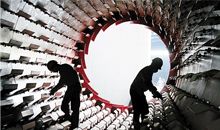China Oct. manufacturing continues expansion with index at 3-month high

Chinese manufacturers continued to see operating conditions improve in October as a key index measuring factory activity rose to a three-month high.
The HSBC/Markit flash China manufacturing purchasing managers' index (PMI) posted at 50.4 this month, up from September's final reading of 50.2, data company Markit said Thursday in a statement.
The output sub-index, however, slid to 50.7 from 51.3 in September, marking the slowest expansion of output in five months, it said.
The sub-indices for new orders and new export orders both went down slightly from September, but remained above the 50-point threshold that demarcates expansion and contraction.
The HSBC/Markit PMI samples 420 small- and medium-sized Chinese manufacturing enterprises. The flash PMI is one of the earliest available indicators of manufacturing sector operating conditions in China. October's final data will be released on Nov. 3.
Commenting on the flash reading, HSBC chief China economist Qu Hongbin said that domestic as well as external demand showed some signs of slowing, although both sub-indices remained in expansion territory.
Disinflationary pressures intensified, as both the input and output price indices declined further. Meanwhile, both employment and inventory indices improved.
While the manufacturing sector likely stabilized in October, the economy continues to show signs of insufficient effective demand, Qu said.
"This warrants further policy easing and we expect more easing measures on both the monetary as well as fiscal fronts in the months ahead," he added.
Bob Liu, an analyst of the China International Capital Corp (CICC), agreed.
"The PMI data show the downward pressure on the economy persists. Monetary policy easing should continue," he said in a note.
Although the reading was slightly higher than market expectations of 50.2, the breakdown of the data suggests that concerns remain about the economy in October, Liu said.
The new export orders index retreated to 52.8, but remained at a high level, suggesting the trend of improvement in exports remained intact. The employment index rebounded by 1.1, the most important factor behind the PMI rise, but the index was still below the threshold reading of 50.
Nomura Securities also said in a note that the components of the PMI are not as encouraging as the headline index appears.
Mixed signals from leading indicators do suggest that growth momentum has only succeeded in stabilizing and that more policy easing is needed to achieve a certain speed of growth, it said.
"We believe the government has already recognized this and has stepped up policy easing. We remain comfortable with our forecast of a temporary growth rebound to 7.6 percent year-on-year in Q4, from 7.3 percent in Q3," it added.
The HSBC/Markit flash PMI came two days after China released key macro economic data for last month and the third quarter, including GDP growth and industrial production growth.
China's economy expanded at a slower pace of 7.3 percent in the third quarter of this year, but still remained within the "reasonable range" set by policymakers, said the National Bureau of Statistics on Tuesday.
In September, industrial production growth picked up to 8 percent year on year, beating market expectations, after a sharp slowdown to 6.9 percent in August.
Industrial production, together with mining, accounted for 44.2 percent of China's total GDP in the first nine months of this year.

























 沪公网安备31010402003309号
沪公网安备31010402003309号